Ross Laidlaw - Attila:The Scourge of God
Здесь есть возможность читать онлайн «Ross Laidlaw - Attila:The Scourge of God» весь текст электронной книги совершенно бесплатно (целиком полную версию без сокращений). В некоторых случаях можно слушать аудио, скачать через торрент в формате fb2 и присутствует краткое содержание. Жанр: Исторические приключения, на английском языке. Описание произведения, (предисловие) а так же отзывы посетителей доступны на портале библиотеки ЛибКат.
- Название:Attila:The Scourge of God
- Автор:
- Жанр:
- Год:неизвестен
- ISBN:нет данных
- Рейтинг книги:5 / 5. Голосов: 1
-
Избранное:Добавить в избранное
- Отзывы:
-
Ваша оценка:
- 100
- 1
- 2
- 3
- 4
- 5
Attila:The Scourge of God: краткое содержание, описание и аннотация
Предлагаем к чтению аннотацию, описание, краткое содержание или предисловие (зависит от того, что написал сам автор книги «Attila:The Scourge of God»). Если вы не нашли необходимую информацию о книге — напишите в комментариях, мы постараемся отыскать её.
Attila:The Scourge of God — читать онлайн бесплатно полную книгу (весь текст) целиком
Ниже представлен текст книги, разбитый по страницам. Система сохранения места последней прочитанной страницы, позволяет с удобством читать онлайн бесплатно книгу «Attila:The Scourge of God», без необходимости каждый раз заново искать на чём Вы остановились. Поставьте закладку, и сможете в любой момент перейти на страницу, на которой закончили чтение.
Интервал:
Закладка:
‘Valentinian, tell us what this is about.’ Concern showed through the regal tones.
Valentinian? Titus went hot then cold, as the enormity of his predicament dawned on him. He had assaulted the Emperor.
‘I was convinced my last hour had come, sir,’ said Titus, when he was safely back at Aetius’ headquarters. ‘When they bound my hands I thought I was about to be marched off for summary execution. Then, when I told Galla Placidia you’d sent me, she ordered me to be released, although it was obvious she was longing to have me put to a horrible death for daring to smack her son. I was escorted down this long peristyle and through a portico to the imperial apartments, where I was given an audience in the reception chamber.’ He looked at Aetius with admiration. ‘You must have huge influence where she’s concerned, sir. When I told her your demands I could see she hated them and felt deeply humiliated, yet she agreed to everything — in writing.’ Titus handed the general a scroll. ‘I witnessed this myself. The whole thing was bizarre. There was Valentinian, all decked out in a purple robe and diadem, with me having to put your points through him to his mother. I actually had to place my finger against the little monster’s forehead — to make the procedure binding, I suppose.
‘Well, sir, I seem to have failed spectacularly as your emissary,’ Titus went on bitterly. ‘I’ve embarrassed you, and made a fool of myself. You can have my resignation now, sir, if you like.’
For a few seconds Aetius regarded him inscrutably. Then, to Titus’ astonishment, he burst out laughing. ‘My dear Titus,’ he chuckled when his mirth had subsided, ‘you’re so refreshingly unsophisticated. Far from wanting your resignation, I wouldn’t part with you for all the corn in Africa. You’ve done me the best service you could possibly imagine. Remember what I told you about animal politics? Well, by smacking the royal arse in loco meo , you’ve reinforced — in a uniquely powerful way — my dominant status in relation to Placidia and Valentinian. Unfortunately, as far as you’re concerned the Empress won’t rest until she’s evened the score.’ The general spread his hands apologetically and gave a wry smile. ‘As from today, you’re a marked man.’
In other words, a dead man walking, thought Titus grimly.
THREE
A large head, small deep-seated eyes, a flat nose, a few hairs in place of a beard, broad shoulders, and a short square body — powerful but ill-proportioned
Description of Attila: Jordanes, Gothic History, 551The first the bear knew of something being wrong, was when a chamois — a creature not normally found this far down the mountain — trotted across the glade he was resting in. The wind changed; snuffing the air, he caught a whiff of the hated man-scent. Instinct prompted him to retreat downhill, but intelligence combined with experience told him that that way lay death. To survive, he must take cover and let the hunters pass him, or break through them to the safety of the higher slopes.
He was a huge animal; at twenty, past his prime, but still extremely powerful and with his cunning unimpaired. These traits he owed to his inheritance. He was perhaps the great-great-grandson of a pair whose strength and intelligence alone had ensured survival from the Roman venatores , gangs who, until a few years previously, had been employed in large numbers by contractors to capture wild beasts for the games. Their depredations over centuries had wiped out most large animals from the Baltic to the Sahara.
Moving with surprising agility, the bear began to climb, looking for a suitable spot where his great bulk could be concealed.
‘Get back, Roman dog.’
‘All right, I can hear you, Hun savage.’ Using the most insulting gesture he knew, Carpilio extended the index and little fingers of his left hand at Barsich, the beater immediately to his right. Nevertheless, he obediently backed his horse until the other’s signal told him he was once more in line with the other beaters.
He and Barsich, a Hun lad of his own age, had become firm friends during the hunt, now in its final day. Sitting among the adult hunters round the evening camp fires, the two boys had shared their food, chunks of mutton roasted on sticks over the embers, and swapped lies about boyhood exploits. During the day, when unobserved by their seniors they had shown off to each other, making their horses caracole and dance near cliff-edges, or swinging under their bellies then remounting at full gallop.
Carpilio couldn’t remember being happier. He had accompanied his father, Aetius, on a diplomatic trip beyond the Danubius river to visit the general’s friends, the Huns. He thought with quiet glee of his schoolfellows back in Ravenna, scratching away at their waxed tablets under the ever-present threat of the master’s birch. Even that snivelling little beast Valentinian would be hard at it. Everyone had heard and laughed about the Emperor’s misadventure with the chickens, and that his Greek tutor had been replaced by a stern disciplinarian imported from Rome. Meanwhile, his formal Roman dalmatic exchanged for baggy trousers and loose tunic, Carpilio was enjoying a glorious freedom, with nothing to do all day but ride, swim, wrestle, and shoot, with other boys. His greatest joy had been riding the Arab-Libyan stallion that was a gift from Attila, his father’s closest friend among the Huns, nephew of Rua, an important chieftain. The Arab showed as much endurance as the hardy though ill-conformed Hun horses, but unlike them displayed spirit and intelligence — invaluable assets in an animal with whom a rider could establish rapport.
The hunt was the climax of the visit. Five days previously, the Huns and their Roman guests had ridden out from their encampment to form a huge circle, extending for many miles, among the wooded foothills of the Carpathus mountains. The circle then began to contract, with the result that the animals within it were driven into a smaller and smaller area which eventually became the scene of mass slaughter. The secret of a successful hunt lay in ensuring that the containing cordon remained intact, with no gaps where animals could slip through. Carpilio marvelled at the skill and discipline with which the beaters — young men and boys with a stiffening of veterans — maintained the line over difficult terrain: ravines, rivers, dense scrub, and clumps of woodland.
The line was moving again. Using only the lightest knee-pressure, Carpilio guided his mount down a scree-covered incline. Away in the distance, flashing sunbursts marked the course of the Tisa. Beyond the river stretched the steppe, a sea of grass rolling to the far horizon, its wind-rippled surface creating an uncanny illusion of waves. A thousand feet below, Carpilio could see the natural amphitheatre that would form the killing-ground. Ahead, the thickets boiled with game, with here and there a deer or goat-antelope breaking cover to race across a clearing. Excitement surged through Carpilio. Like the other boys, he would not be allowed to touch large or dangerous animals such as bison, lynx, or wolf; those were reserved for adults. But there would be plenty of pickings for the youngsters: marmots, blue hares, and the smaller hoofed creatures.
‘Carpilio!’
The young Roman looked back. Above him, just beginning to descend the scree, was Aetius, mounted on Bucephalus, his favourite steed. Beside him rode Attila, a short but powerful figure, with a huge head and immensely broad shoulders.
‘Good hunting, Father,’ Carpilio called eagerly, returning the general’s wave.
‘The same to you, son.’
At the bottom of the slope, the line of beaters paused to straighten out, the delay allowing Aetius and Attila to close the gap, then it pressed on into a tract of dense-packed bush.
Читать дальшеИнтервал:
Закладка:
Похожие книги на «Attila:The Scourge of God»
Представляем Вашему вниманию похожие книги на «Attila:The Scourge of God» списком для выбора. Мы отобрали схожую по названию и смыслу литературу в надежде предоставить читателям больше вариантов отыскать новые, интересные, ещё непрочитанные произведения.
Обсуждение, отзывы о книге «Attila:The Scourge of God» и просто собственные мнения читателей. Оставьте ваши комментарии, напишите, что Вы думаете о произведении, его смысле или главных героях. Укажите что конкретно понравилось, а что нет, и почему Вы так считаете.












